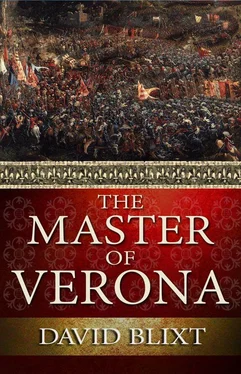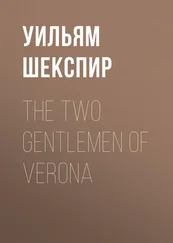David Blixt - The Master of Verona
Здесь есть возможность читать онлайн «David Blixt - The Master of Verona» весь текст электронной книги совершенно бесплатно (целиком полную версию без сокращений). В некоторых случаях можно слушать аудио, скачать через торрент в формате fb2 и присутствует краткое содержание. Год выпуска: 2012, Издательство: Sordelet Ink, Жанр: Исторические приключения, на английском языке. Описание произведения, (предисловие) а так же отзывы посетителей доступны на портале библиотеки ЛибКат.
- Название:The Master of Verona
- Автор:
- Издательство:Sordelet Ink
- Жанр:
- Год:2012
- ISBN:нет данных
- Рейтинг книги:5 / 5. Голосов: 1
-
Избранное:Добавить в избранное
- Отзывы:
-
Ваша оценка:
- 100
- 1
- 2
- 3
- 4
- 5
The Master of Verona: краткое содержание, описание и аннотация
Предлагаем к чтению аннотацию, описание, краткое содержание или предисловие (зависит от того, что написал сам автор книги «The Master of Verona»). Если вы не нашли необходимую информацию о книге — напишите в комментариях, мы постараемся отыскать её.
The Master of Verona — читать онлайн бесплатно полную книгу (весь текст) целиком
Ниже представлен текст книги, разбитый по страницам. Система сохранения места последней прочитанной страницы, позволяет с удобством читать онлайн бесплатно книгу «The Master of Verona», без необходимости каждый раз заново искать на чём Вы остановились. Поставьте закладку, и сможете в любой момент перейти на страницу, на которой закончили чтение.
Интервал:
Закладка:
The letter that arrived three months later — addressed to her! — was curt:
The correction was, it seems, justified, for the mistake was not mine but your brother Giovanni's, whose understanding of dictation is more lacking than his grasp of hygiene. For the sake of the poem, I am grateful, but you must understand how wary I remain of any tampering with my words. Never do it again. Your loving father, et cetera.
This letter, a few scant lines from a man who was known to fill pages with irrelevant gossip, became Antonia's most prized possession. Wanting to reply immediately, she was wise enough to refrain until she had another literary subject to address.
She hadn't long to wait. A fortnight later, Cecco Angiolieri stole lines from an early work of Dante's to use in his own new poem. Antonia wrote to inform her father, who sent back a furiously scathing diatribe regarding Angiolieri's talent and wit to be published in Florence. This he addressed not to his wife, Gemma, but to Antonia. From that day forward his daughter became his connection to his Florentine publishers.
Over time his letters grew a shade longer, and by the time she was ten he was treating her as equal to his many other correspondents. "I do miss her," he lamented on the eve of Antonia's eleventh birthday, just after the death of her brother Giovanni. In a mournful mood, the poet was referring not to Antonia's mother but to the woman who had possessed his soul from the time he was seven. Beatrice Portinari.
The bringer of blessings has been dead more than two decades, longer than I can fathom having lived. Though she survives in my mind and in my words — much of which was written to be read by her — with each passing day it grows harder to remember her face. I suppose I grow old. My eyes begin to fail me. But to have my innermost eye blinded by time, that is a cruel trick. I know she is a cherished soul in Heaven, but my earth is poorer for the lack of her. Only when I write to her can I feel her presence. And of late I cannot take up my pen to write to her, for I feel she is truly dead.
Antonia's response was simple. It read:
In the future you may address me as Beatrice.
The change this brought to the poet's correspondence was as night to day. From a single sheet, his letters grew to ten or twelve pages on average. From four times a year they appeared almost every fortnight. At the same time all letters to Gemma ceased completely. "Tell their mother that my sons are well," he would often append, the only mention he would make of his wife. No longer curt, there remained discussion of poetry, but suddenly much more. Dante shared every daily event, every idea, everything he thought his beloved Beatrice might wish to know. His letters became long and rambling. Sometimes he seemed to forget which Beatrice he was writing to. But Antonia accepted that. She was fulfilling a function in her father's life. His writing flourished, and she found great joy thinking she might have contributed in some way.
At last her eyes were dry. And she had won her father an excellent deal. With a last superstitious nod to Mars, Antonia resumed her walk. Passing the shops of the Ponte Vecchio, she saw a new sign, freshly hung. A silversmith? On the Ponte Vecchio, where only fruit, nuts, and grain were sold. Antonia deemed it foolish and moved on.
Over the Arno she walked to an interview that promised to be at least as unpleasant as the one with Mosso. But it was their own fault, they hadn't listened! Not when she told them how popular L'Inferno had been in Rome and Verona and Venice and Pisa and even the small bits Dante had shown people in Paris; not when she told them that it would be twice as popular here, in the poet's birthplace, regardless of his political status; and not when she told them they stood to make a killing if only they ordered enough copies to satisfy demand — a demand that would shame both La Roman de la Rose and all those silly Arthurian romances.
They hadn't listened, fearing instead the wrath of the Arti, the guilds, who had been part of Dante's exile. It was now clear that L'Inferno was something more than a mere novella, and the whole city was paying the price. Florence, one of the most literate cities in the world, suddenly feared being left out of a cultural phenomenon. It serves them right , thought Dante's daughter tartly. Since the order of exile had also beggared her family, she saw it as only justice that the whole city of Florence should pay them back tenfold.
Climbing the slight uphill grade to the road, she passed the house whose rooms she had let months ago. Inside scribes hunched day and night over vellum, cramped fingers scratching away. She decided to step inside and pass an hour. She was still a little shaken. And she liked to keep them on their toes.
Crossing the threshold of the small rented apartment on the Via Toscanella, she listened. Nothing but scratching. Good . That a bell had been added, then removed, was evident from the small fasteners at the top of the door. The first time she'd heard the small chime, Antonia had told the scribes to take it down. "I am not a cat."
Now she glided past the well-oiled hinges into the main workroom. "Good morning. No no, keep at your work." Glancing at all the chairs, Antonia made a face. As she thought, there were only five of the seven present. She made a mental note of which ones were lollygagging in the back room. If it was repeated, they would be gone.
The Master Scribe, one Guido Cerdone, approached Antonia with resignation. He knew he would have to make excuses for the two men. They'd started having meals in shifts, so that someone would always be working when the Little Mistress appeared, as she so often did. That way, someone would always be working and the Little Mistress wouldn't go into a fit. "Mistress, I gave Donatello and Giambattista leave to eat-"
She cut across him abruptly. "Maestro Cerdone, I have news. Demand has risen. I will give a ten percent bonus for any complete manuscript finished in the next two weeks."
The four men at their desks all glanced at each other before bending to their desks in renewed effort. One in particular looked like he was having trouble keeping his hand steady, so excited he was.
"Mistress," said Cerdone, stepping into the hall and indicating Antonia should follow. "Two weeks is hardly enough time. You and I both know it takes two to three months to turn out a well-made book. At least a month for one of the lowest standards."
"Maestro Cerdone, I know perfectly well how long it takes to create a book. But you have several editions in various stages of completion, and I want those as soon as possible. If the men wish to work late over the next couple weeks, I will see that food is laid for their supper."
She was being generous. Between the incentive of the bonus and the promise of a meal each night, the men would work all the harder for her. Cerdone's annoyance was due to the fact that he had just begun another edition, and since it would take him considerably longer than two weeks to complete it, he would never see that bonus.
One of the men in the main room sighed in satisfaction. "Mistress Alighieri, I'm done."
The Little Mistress crossed to the man's chair and glanced down at the page, which was attached by a deerskin thong to the man's "desk" — little more than a board placed across his lap. There was a hole in the desk so the horn of ink would be easily accessible. Laying close by was a razor, a pumice, and a ruler, all used for cleaning the parchment and measuring the columns. Scattered about the room were several mutilated quills, which would be sold at the end of the week to the nearest theatre for costume supplies.
This particular page had a large space reserved for the artist (who worked upstairs, alone, day and night — a queer fellow, but wonderfully talented with his wood-cuts) to insert his rendition of the emergence from Hell. The final lines of L'Inferno filled the rest of the page in lovely, swooping calligraphy that rose and fell like waves on the ocean. Antonia read the last lines, then the standard copier's addendum:
Читать дальшеИнтервал:
Закладка:
Похожие книги на «The Master of Verona»
Представляем Вашему вниманию похожие книги на «The Master of Verona» списком для выбора. Мы отобрали схожую по названию и смыслу литературу в надежде предоставить читателям больше вариантов отыскать новые, интересные, ещё непрочитанные произведения.
Обсуждение, отзывы о книге «The Master of Verona» и просто собственные мнения читателей. Оставьте ваши комментарии, напишите, что Вы думаете о произведении, его смысле или главных героях. Укажите что конкретно понравилось, а что нет, и почему Вы так считаете.












